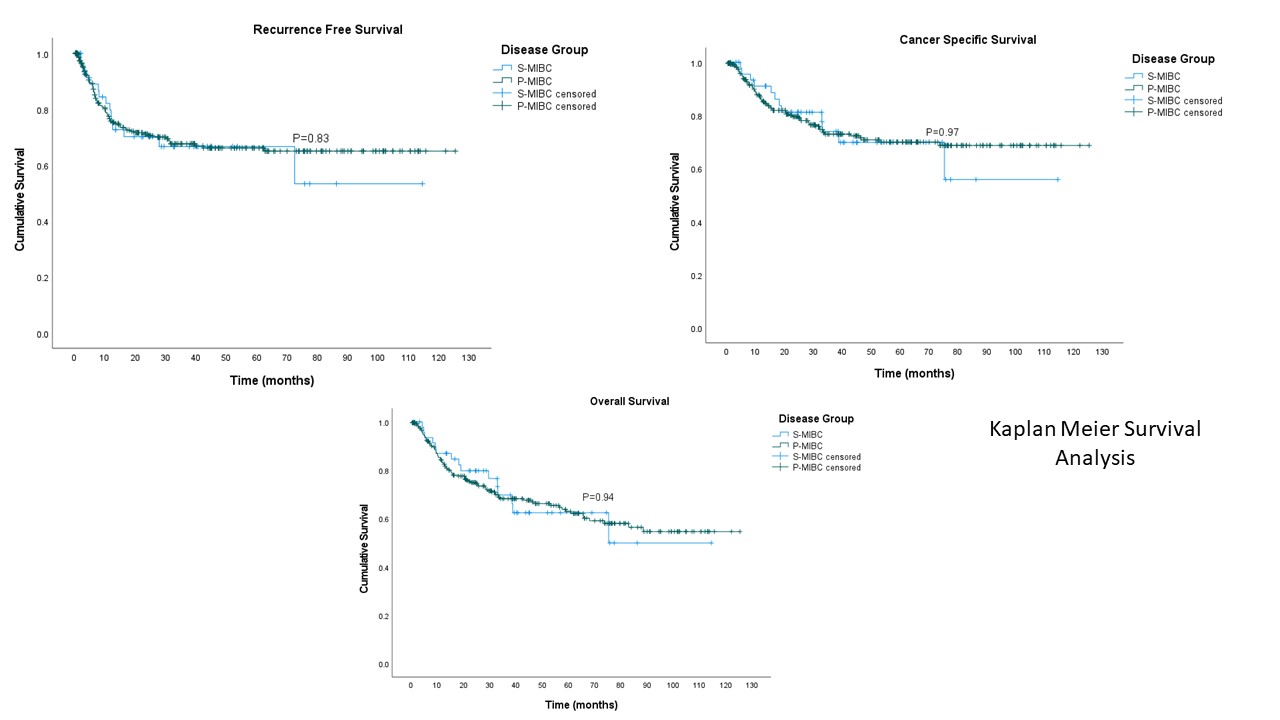Back
Poster, Podium & Video Sessions
MP03: Bladder Cancer: Invasive I
MP03-15: Primary versus Secondary Muscle Invasive Bladder Cancer: Comparing the Pathologic and Oncologic Outcomes between Both forms of Muscle Invasive Disease When Treated with Standard of Care.
Friday, May 13, 2022
7:00 AM – 8:15 AM
Location: Room 222
Tarik Benidir*, Zaeem Lone, Ao Zhang, Carlos Munoz-Lopez, Pranay Hegde, Kevin Fung, Jesse Fajnzylber, Eric Klein, Mohammed Eltemamy, Jihad Kaouk, Georges Pascal-Haber, Nima Almassi, Christopher Weight, Byron Lee, Cleveland, OH
- TB
Tarik Benidir, MD, FRCS, MSc
Resident
Cleveland Clinic
Poster Presenter(s)
Introduction: Primary muscle invasive bladder cancer (P-MIBC) is the most common presentation at initial consultation; however, a subset of patients progress to MIBC following initial management for non-muscle invasive bladder cancer (NMIBC). The latter has been coined secondary MIBC (S-MIBC) and may exhibit decreased sensitivity to cisplatin-based chemotherapy. We aimed to explore response to neoadjuvant chemotherapy (NAC) and oncologic outcomes between P-MIBC and S-MIBC patients receiving radical cystectomy at a high-volume tertiary care center.
Methods: We performed a retrospective review of radical cystectomy (RC) patients from 2010 to 2019 who were cT2-T4/N0 and treated with a cisplatin-based NAC regimen. Patients were defined as S-MIBC if they had history of NMBIC, were treated with at least one course of induction BCG, and progressed to MIBC. Our primary outcomes of interest were down-staging rates, which was defined as
Results: 333 patients were included (48 S-MIBC vs. 285 P-MIBC). Following NAC and RC, there were no differences in down-staging rates between both groups (S-MIBC: 54% vs. P-MIBC: 51%, p=0.67). There was no difference in complete pathologic response rates between the two groups (S-MIBC: 33% vs. P-MIBC: 28%, p=0.41). There were no differences in CSS (p=0.97), OS (p=0.94), or RFS (p=0.83). On Cox Proportional Hazards regression, only ³ pT2 and N+ disease predicted poorer CSS, OS, and RFS.
Conclusions: S-MIBC is an uncommon presentation as compared to P-MIBC. In our patient population, there were no differences between P-MIBC and S-MIBC with respect to cisplatin sensitivity and oncologic outcomes. Future studies should focus on molecular biomarkers that can predict NAC response in these patients.
Source of Funding: N/A

Methods: We performed a retrospective review of radical cystectomy (RC) patients from 2010 to 2019 who were cT2-T4/N0 and treated with a cisplatin-based NAC regimen. Patients were defined as S-MIBC if they had history of NMBIC, were treated with at least one course of induction BCG, and progressed to MIBC. Our primary outcomes of interest were down-staging rates, which was defined as
Results: 333 patients were included (48 S-MIBC vs. 285 P-MIBC). Following NAC and RC, there were no differences in down-staging rates between both groups (S-MIBC: 54% vs. P-MIBC: 51%, p=0.67). There was no difference in complete pathologic response rates between the two groups (S-MIBC: 33% vs. P-MIBC: 28%, p=0.41). There were no differences in CSS (p=0.97), OS (p=0.94), or RFS (p=0.83). On Cox Proportional Hazards regression, only ³ pT2 and N+ disease predicted poorer CSS, OS, and RFS.
Conclusions: S-MIBC is an uncommon presentation as compared to P-MIBC. In our patient population, there were no differences between P-MIBC and S-MIBC with respect to cisplatin sensitivity and oncologic outcomes. Future studies should focus on molecular biomarkers that can predict NAC response in these patients.
Source of Funding: N/A


.jpg)
.jpg)